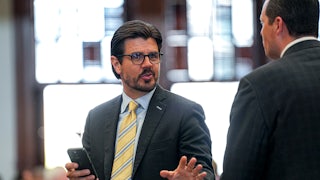Earlier this year, southern Arizona was staring down a crisis—“homelessness on steroids,” as Pima County’s top official described it. Federal funding for the state’s migrant shelters was about to run dry as near-record numbers of migrants were entering the state from Mexico. Diego Piña Lopez, then the executive director of one of the state’s largest shelter operators, was among the leading voices warning in local and national media about the dire local consequences of the budget fight in Washington.
“I think that’s going to lead to a lot of chaos, and a lot more cost across the board for folks to get services,” he told The Arizona Republic just days before funding was expected to run out. Casa Alitas, a Tucson shelter run by a large local charity, Catholic Community Services of Southern Arizona, or CCS, would be forced to close some of its facilities, sending as many as 400 migrants a day out into the streets. Thirty staffers had already been told they’d be out of a job if funding didn’t come through by month’s end.
Congress, as is its wont, waited until the eleventh hour to pass a $1.2 trillion bill to fund the government, which staved off the feared crisis in southern Arizona. But one notable CCS employee did lose his job in the spring: Piña Lopez.
The circumstances of his exit have been murky, at least until now. Documents shared with The New Republic by an anonymous source reveal that a laundry company hired by the CCS employees who ran Casa Alitas had been overcharging the federally funded charity by at least $200,000. But that’s not all: The owner of the laundry company is Piña Lopez’s mother.
The story of Casa Alitas—its rapid expansion from an all-volunteer community group to a multimillion-dollar operation, Piña Lopez’s meteoric rise from intern to executive director, and now an apparent corruption scandal—is in some ways exceptional. But in other ways, it’s a deeply familiar tale about the myriad, unpredictable local ripple effects of America’s failing national immigration system.
Diego Piña Lopez was finishing grad school, where he studied social work and public administration, when he joined Casa Alitas as an intern. The shelter had begun in 2014 as an all-volunteer, grassroots effort when U.S. Border Patrol began dropping off asylum-seekers in the middle of Tucson, leaving them to fend for themselves for months as they awaited their court proceedings.
Casa Alitas was still a humble program of CCS as recently as 2019, located in a modest old house in central Tucson and serving no more than 30 asylum-seekers a day. But then, demand for its services exploded as the number of migrants entering Arizona skyrocketed. Casa Alitas went from processing around 18,000 asylum-seekers in 2019 to 85,000 in 2022 to 195,000 in 2023, according to local reporting by Arizona Luminaria. As of several months ago, the shelter was serving as many as 1,800 asylum-seekers per day.
Casa Alitas is hardly alone. The migration crisis—and the glut of federal funding to address it—has led to an explosion of shelters in border states, part of a billion-dollar industry of migrant housing, care, and transportation that is fueled by federal dollars. But this rapid growth has not been matched with heightened oversight, putting taxpayer money at risk of misuse or fraud.
For instance, the American Rescue Plan Act of 2021 allocated $110 million to the Federal Emergency Management Agency for emergency food and shelter for migrants encountered by the Department of Homeland Security. The inspector general’s office of DHS audited local recipients of the funds in California, Arizona, New Mexico, and Texas, and concluded, per the title of its March 2023 report, “FEMA Should Increase Oversight to Prevent Misuse of Humanitarian Relief Funds.” Sample testing had found that 58 percent of the recipients’ claimed expenses—representing $7.4 million—were missing the required supporting documentation.
The audit also found financial discrepancies, such as $7,000 in miscalculated or unsupported expenses and a duplicate $40,000 reimbursement—but nothing approaching the scandal smoldering in Tucson, Arizona.
The first hint that something was amiss came in a vaguely worded May 17 memo by Pima County Administrator Jan Lesher—the one who had warned of “homelessness on steroids”—to the county’s Board of Supervisors. The memo said that CCS, which last year spent $14.5 million in federal money, had discovered that a vendor that provided services to the shelter was working without a contract, in violation of county and federal law. Elena Dwyre, the CEO of CCS, was quoted in the memo saying that the vendor had “overcharged” the nonprofit. “Upon further investigation,” Dwyre added, “we learned that two employees had violated our conflict of interest and purchasing policies. Those employee relationships were quickly terminated, the contractor relationship was likewise discontinued, and program partners were promptly notified of the issue.” The memo did not mention the names of the two employees or the name of the vendor and the services it provided.
In the ensuing weeks, the few news items about the matter in the local press were equally vague because neither Lesher’s office nor CCS offered additional details. Dwyre, in fact, even appeared to mislead the public. The Green Valley News interviewed Dwyre, who claimed that her organization, in the paper’s words, “did not identify any personal relationship between the terminated employees and the vendor.”
But thanks to an anonymous source who shared with The New Republic internal documents from Casa Alitas and Catholic Community Services, we are now able to reveal the full story.
Just outside the town of Amado, 30 miles north of the Arizona-Mexico border, sits a sprawling residential ranch estate surrounded by rolling desert hills and jagged purple mountains. With its sage green front gates shut tight under a 15-foot-tall log archway, the ranch house doesn’t look like the sort of place where mass orders of laundry are washed or dry-cleaned. Yet this is the registered address of the Amado Laundry Service.
For nearly a year, until this past January, the company submitted at least 37 laundry invoices to CCS and Casa Alitas—which is located nearly 40 miles away in Tucson—for tens of thousands of pounds of towels, blankets, comforters, and other laundry. The total bill came to $411,967. An analysis of rates of several comparable laundry operators in Tucson reveals that Amado was grossly overcharging CCS by as much as nearly 300 percent. (Amado charged between $3.10 and $4.50 per pound, whereas competitors charged as little as $1.15 and no more than $2.80.) What’s more, CCS may have overpaid Amado: Photocopies of checks written to the company by the nonprofit amount to $438,940.55.
It gets shadier. According to records from the Arizona Corporation Commission, Amado Laundry wasn’t even created until May 2023—several weeks after it began submitting invoices, on March 31—and is registered to Irene A.G. Piña. She’s the mother of Piña Lopez, the CCS executive director at the time. He, of course, is one of the two employees whose relationship with CCS was, in Dwyre’s words, “quickly terminated”; the other was his immediate supervisor, CCS director of operations Teresa Cavendish.
Piña Lopez declined to comment on the record. His mother couldn’t be reached for comment. Teresa Cavendish didn’t respond to several phone calls and texts from The New Republic.
But a March report submitted to the Federal Audit Clearinghouse by Keegan Linscott & Associates, a Tucson-based accounting firm that had prepared CCS’s tax returns in recent years, cites a “significant deficiency” in CCS’s hiring of an unnamed vendor. CCS, according to the report, “did not utilize a formal procurement method in selecting” the vendor, apparently due to “an immediate need to obtain services and an oversight to subsequently conduct a formal procurement method.” The firm recommended that all staff receive “periodic training” to ensure that they comply with procurement policies. An addendum to the report signed by the chief financial officer of CCS, Jesus Fernandez, agreed with the findings and recommendations, and pledged—as part of a “corrective action plan”—to update its purchasing policies and provide better training in the future.
Fernandez did not respond to multiple requests for comment from The New Republic. Dwyre did not answer questions about why the charity selected Amado or about the discrepancy between the invoice amounts and the amount paid to Amado, but she stated that “we can confirm that the services were provided”—in other words, that Amado did indeed launder clothes for Casa Alitas.
Jan Lesher, the Pima County administrator, also did not respond to multiple requests for comment. Her communications director, Mark Evans, referred The New Republic to the details of the May 17 memo and noted that some questions “will be provided to you in the public records request you filed May 28. Those records are still under review by the County Attorney and until the County Attorney releases them, we are not going to comment about information that may be included in those records due to the risk that it may have been redacted and not subject to release under the state’s records law.”
Democratic Congressman Ruben Gallego, who is facing off with Republican Kari Lake for a Senate seat this November, has called for an overhaul of FEMA’s shelter and services program, which funds CCS to operate Casa Alitas. “As with any grant program, it is important that funds are being spent appropriately by fiscal agents and grant recipients,” he wrote in a policy paper released last November. “However, since SSP was created with one sentence [in the 2023 fiscal omnibus package], there is no codified structure in place for oversight and accountability.”
And this insufficient oversight extends well beyond nonprofits like CCS. Migrant services has become a billion-dollar industry dominated by giant nonprofits like Southwest Key, which the Justice Department sued in July, alleging that its staff at multiple facilities (mainly in Texas but also in Arizona) sexually abused migrant minors in their care; and for-profit companies like DocGo, whose employees and subcontractors in New York City have allegedly “mistreated and lied to migrants, provided them with fake work papers, wasted staggering amounts of food and hired unlicensed security guards,” according to The New York Times. Both organizations have been accused of financial improprieties: self-dealing in Southwest Key’s case, and billing fraud in DocGo’s case.
Such cases only provide another opening for the right to attack migrant shelters, which anti-immigration pundits and politicians have long claimed bring crime to towns and cities—a lie that nonetheless gains purchase in some communities, imperiling the funding needed to sustain the shelters.
In fact, that’s exactly what happened in Pima County at a contentious Board of Supervisors meeting in October 2023. Then-Supervisor Sharon Bronson, a Democrat, joined the lone Republican on the five-person board to oppose accepting federal funding for the shelters. “We have just become enablers, and the problem … rests with the federal government,” she said. They were on the losing side of a 3–2 vote, but all five seats are up for grabs this November, with well-funded Republican candidates in the running.
The leaders of Bronson’s party have also been trending toward more punitive, restrictive immigration policies. In early June, President Biden instituted a new border policy that effectively bans asylum requests between ports of entry whenever unauthorized crossings exceed 2,500 per day. This came after a bipartisan deal in the U.S. Senate—which, while increasing Border Patrol resources and expanding Immigration and Customs Enforcement’s detention capacity, also would have sped up the asylum process, in part by funding thousands of new officers to process asylum claims—fell apart over Republican fears that it would help Biden’s reelection campaign.
So for the foreseeable future, humanitarian relief will play an essential role in America’s patchwork immigration system—and that includes Casa Alitas. Without these migrant shelters, communities like Tucson might indeed face “homelessness on steroids.”






